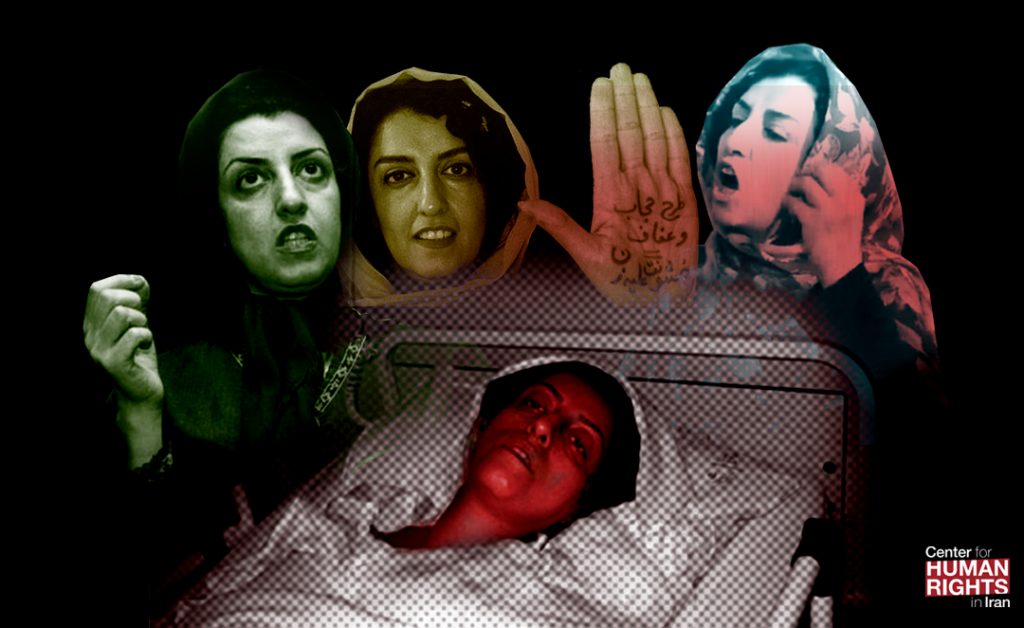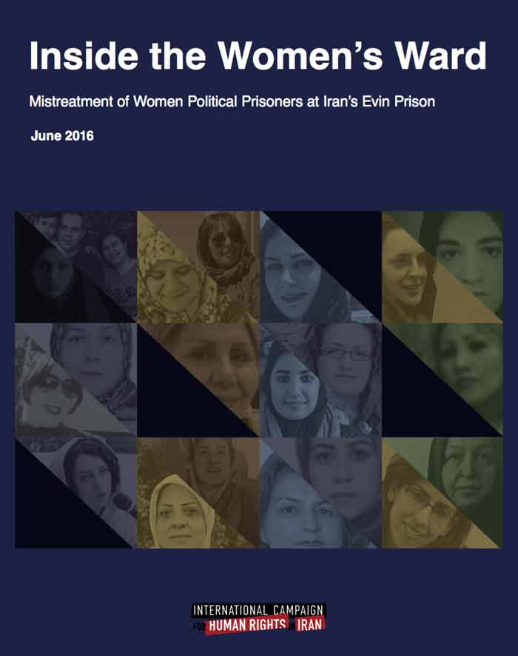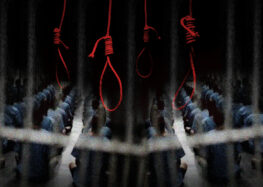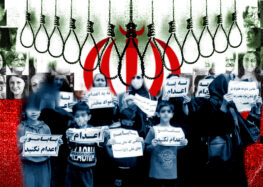Open Letter From Evin Prison: Narges Mohammadi Calls on Tehran Prosecutor to Stop Denying Her Medical Treatment

Iranian political prisoner Narges Mohammadi has written an open letter calling on Jafari Dowlatabadi, the prosecutor general of Tehran, to stop denying her medical treatment.
According to her letter, Mohammadi has not been allowed to see a doctor outside the prison for one year and a half despite suffering from life-threatening ailments including seizures and blood clots.
“I will not go into the unfair sentences against me,” she writes, “but I am asking Your Excellency to at least take steps to allow me to have access to medical treatment and specialist physicians who have been taking care of me for years, as well as access to medications.”
Political prisoners in Iran, including elderly inmates, are singled out for harsh treatment, which often includes denial of medical care. The threat of withheld medical care has also been used as an intimidation tool against prisoners who have challenged the authorities or filed complaints.
The Center for Human Rights in Iran (CHRI) revealed in 2016 that political prisoners held in the Women’s Ward of Evin Prison endure inhumane conditions, including the denial of proper medical care in a prison infirmary that is dirty and lacking in supplies and medical specialists, denied or delayed transfer to hospital and specialists for treatment of serious illnesses, inadequate nutrition, and intermittent lack of heat.
According to Article 520 of Iran’s Code of Criminal Procedures, prisoners suffering from acute illnesses are eligible for five days of leave if approved by the prosecutor. Article 522 states that prisoners who require medical treatment outside the prison for non-urgent issues are eligible for release for a period of time determined by a criminal court judge. (These articles and information about Mohammadi’s case appear at the bottom of Mohammadi’s letter).
Your Excellency, Mr. Jafari Dowlatabadi
The Honorable Prosecutor of Tehran
With greetings and respect,
For unknown reasons I have not been transferred for medical treatment for a long time and my inquiries in prison as well as through lawyers outside prison have not had any results.
When Your Excellency visited me in Evin Prison when I was being held in solitary confinement in Ward 209, you were made aware of the fabricated case made against me by the Intelligence Ministry and right then you realized that the investigator’s allegation regarding the confiscation of a van full of flyers at my home was a lie and you issued a revised order to keep me in temporary detention. Yet I was sentenced to six years in prison.
In 2011, you realized that the judicial authority in charge of the court in Evin Prison, Mr. Reshteh Ahmadi, fabricated a letter on my behalf and ordered my illegal transfer to the women’s ward in Zanjan Prison and I was kept there for several months.
Even though I was perfectly healthy before being detained, I suffered from bouts of nervous attacks as a result of psychological pressures in solitary confinement in Ward 209 and experienced several seizures in Zanjan Prison, for which there exists medical records and brain scans taken at Valiasr Hospital in Zanjan that have been marked confidential.
Unfortunately, in 2016 you were again a witness to a heavy sentence issued against me and I was condemned to serve 16 years in prison as Your Excellency’s representative fully cooperated with the un-impartial judge.
In the aftermath of this unjust sentence, what is important is the way I am being treated in the women’s ward of Evin Prison. I have not been dispatched for medical treatment for a long time without any explanation.
1- According to medical documents and evidence, some time ago I was diagnosed with pulmonary embolism, which requires medical attention as well as stringent tests. It has been at least a year and a half since I was permitted to see the specialist doctor who has been treating me for years. He has submitted several requests through my lawyer to judicial and prison authorities to get permission for my medical visit.
2- Because of the usage of anti-blood clotting pills such as Warfarin, I have developed a feminine disease for which the last medical treatment I received was in 2017 and since then, I have not been able to see my long-time personal physician. Meanwhile, it is very obvious that I need specialist treatment because I am taking anti-blood clotting agents for my pulmonary embolism and coagulation pills to prevent [vaginal] bleeding but no action has been taken.
3- After a two-year delay and a lot of pain and suffering, I underwent a gallbladder operation and during an endoscopy of my esophagus, doctors discovered an inlet patch which is not causing any particular problem at the moment but I worry it could become problematic in the future. The presiding doctor submitted a detailed report to the prison along with photographs and recommended that I be checked by Prof. Malekzadeh and my personal physician at a hospital in September of this year but this did not happen.
4- After prolonged incarceration in solitary confinement in Ward 209 [in Evin Prison] and Zanjan Prison, I suffered seizures and was put under the supervision of a neurologist but I have been prevented from visiting him for a long time.
Mr. Prosecutor,
Unfortunately, I have no hope that fairness and justice would be observed by the judicial system. Therefore, I will not go into the unfair sentences against me, but I am asking Your Excellency to at least take steps to allow me to have access to medical treatment and specialist physicians who have been taking care of me for years, as well as access to medications.
I have no intention of exaggerating my illnesses and I don’t endorse such tactics by anyone including myself. But I believe this is unfair to those who are sicker than I am. Let me remind you that when Dr. [Alireza] Rajaee’s eye and [part of] his face were removed, I read [Deputy Judiciary Chief Gholam-Hossein Mohseni] Ejei’s interview in the newspaper in which he denied any responsibility on behalf of the judiciary.
Also, when I heard the news about Dr. Kavous Seyed-Emami’s death, again I read Mr. Ejei’s interview denying the judiciary’s responsibility.
1- As I mentioned earlier, my doctor has said that the inlet patch in my esophagus is not problematic at the present time but it could become a cause for concern and those suffering from it need attention away from stressful environments. Since being diagnosed, I have not been given permission to see my physician.
2- The use of [anti]blood-clotting pills along with coagulation pills have been described as worrisome by the specialist doctors and there are many documented reports about this in my file that have been confirmed even by the prison’s medical doctor. If untreated, they could be life threatening and this is why I am obliged to write this open letter. Obviously, the judiciary will be responsible for any danger to my life.
CC: Minister of Justice, Minister of Health, Parliamentary Committee for Health Affairs
Narges Mohammadi
November 28, 2018
Iran’s Code of Criminal Procedures, Article 520: Prisoners can be granted furlough for a maximum of three days per month on condition of compliance with prison rules and regulations and participation in reform activities and earning points, subsequent to leaving an appropriate security deposit. In cases of serious illness or the death of close relatives or a child’s wedding, prisoners can be granted furlough for five days with the prosecutor’s approval…
Article 522: If a convicted person requires treatment outside the prison, the presiding judge can set a period necessary for treatment based on the Medical Examiner’s opinion and payment of a security deposit, while delaying the implementation of the sentence. If the convicted person does not provide a security deposit, hospital treatment will take place under guard and the period of treatment will be considered part of the prison term. Note: The dispatch of persons who are already in prison for treatment will be covered by these same provisions.
Mohammadi, who was awarded the Per Anger Prize for her peaceful defense of human rights in Iran in 2011 and the American Physical Society’s Andrei Sakharov Prize in April 2018, was first arrested in 2009 and sentenced to 11 years in prison for the charges of “assembly and collusion against national security,” “membership in the Defenders of Human Rights Center,” and “propaganda against the state.”
Upon appeal, her sentence was reduced to six years behind bars and she was released from Zanjan Prison in 2013 on medical grounds.
She was arrested again on May 5, 2015, two weeks after meeting with Catherine Ashton, the European Union’s foreign policy chief at the time, at the Austrian Embassy in Tehran.
In September 2016, Branch 26 of the Tehran Appeals Court upheld a 16-year prison sentence against Mohammadi for the charges of, “membership in the [now banned] Defenders of Human Rights Center,” “assembly and collusion against national security,” and one year for “propaganda against the state.”
She will be eligible for release after serving 10 years.







